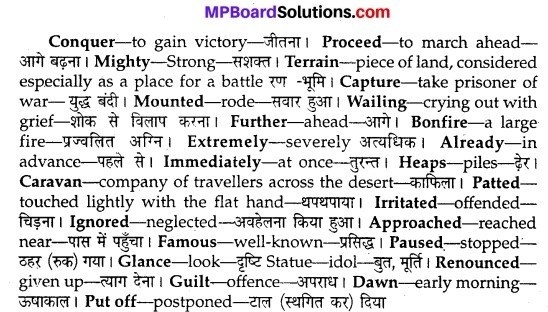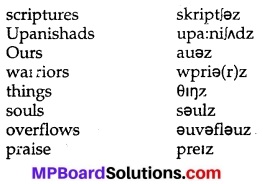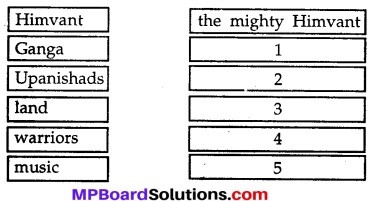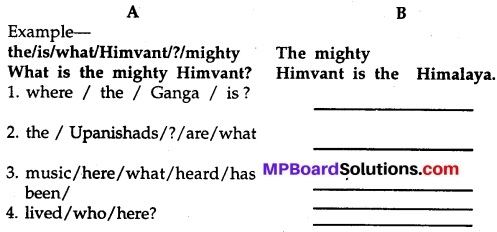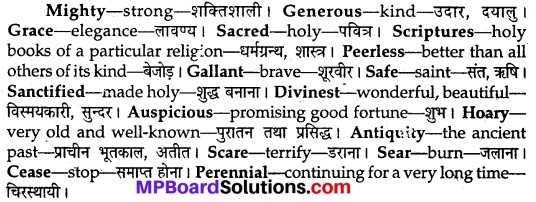MP Board Solutions for Class 9 English The Rainbow Solutions Chapter 3 Little Girls Wiser than Men Questions and Answers aids you to prepare all topics in it effectively. You need not worry about accuracy of Madhya Pradesh State Board Solutions for Class 9 English Chapter 3 Little Girls Wiser than Men as they are given adhering to the latest exam pattern and syllabus guidelines. You Can Download MP Board Class 9 English Solutions Questions and Answers, Notes, Summary, Guide pdf on is page. Enhance your subject knowledge by preparing from Chapterwise MP Board Solutions for Class 9 English and clarify your doubts on corresponding topics.
MP Board Class 9th English The Rainbow Solutions Chapter 3 Little Girls Wiser than Men
Kick start your preparation by using our online resource Madhya Pradesh State Board Solutions for Class 9 English The Rainbow Solutions Chapter 3 Little Girls Wiser than Men. You can even download MP Board Solutions for Class 9 English free of cost rough direct links available on our page. Clear your queries and understand concept behind in a simple manner. Simply tap on concept you wish to prepare chapterwise and go rough it.
Little Girls Wiser than Men Textual Exercises
Little Girls Wiser than Men Vocabulary
A. Match the words given under ‘A’ with the meanings given under ‘B’
A- B
1. stream – (a) noisy ill-tempered woman
2. catch – (b) understand
3. heads – (c) crowd of people or things all
4. A shrew – (d) moving in one direction barren land
5. fallow – (e) the front side of a coin,which often has the head of a king, queen, president etc on it.
Answer:
1. (c), 2. (b), .3. (e), 4. (a), 5. (d).
B. Use the following words in sentences pf your own. watch, look, except, folly, stains.
Answer:
God is watching you. I have no watch to see the time. Why is he looking at you? .
All the girls except Rajni are present.
It is a folly to backbite others.
Remove the stains from your hands.
C. Find single words in the lesson which have the meanings given below.
1. a way, course, or passage for liquids.
2. a Christian holy day in March or April when Christians remember the death of Christ and his return to life.
3. only just
4. not obeying a parent, teacher, set of rules etc.
5. close fitting nylon garments covering the foot and leg, worn v especially by women.
Answer:
- Channel
- Easter
- soon
- fancy
- stocking.
D. If the word ‘’NEVER’ occurs before a pause or before a word beginning with a consonant (as in ‘never better’) then it is pronounced with no/r/ sound. If the immediately following word begins with a vowel, then /r/ is pronounced.
Now say-
better off, here it is, four or five, dark cloud Easter.
Answer:
For self-attempt.
Comprehension
A. Answer each of the following questions in about 25 words.
Who is younger, Malasha or Akoulya? How do you know?
Why did Akoulya run after Malasha?
Why did the girls dig the channel?
What made men laugh at themselves?
Answer:
1. The two girls met in a lane between two farm houses.The dirty water of the farmyards had formed a large puddle there. They were playing there :
2. Malasha is younger than Akoulya. The following lines give us the clue. the smaller one was going to step into the puddle, shoes and all, when the elder checked her ‘Don’t go in so, Malasha, said she.
3. Akoulya and Malasha got near each other. Malasha started splashing water. Akoulya asked her not to do so. Just then, Malasha plumped down her foot. The water splashed right on Akoulya’s frock, eyes and nose. Akoulya saw the stains on her frock. She got angry and desired to strike her. Therefore, Akoulya ran after Malasha.
4. ‘ Akoulya dug the channel through which the water could run out into the street. Malasha joined her. They dug the channel so that they could run each side of the little stream. They could also float a chip of wood in it.
5. The two mothers were quarrelling with each other. They had also come to blows. TK&men were also beginning to fight. Just then, they saw the water flowing trom the girls’ channel towards them. The men looked at the little girls. They were playing happily together. They had forgotten everything. It made men laugh at themselves.
B. Answer each of the following questions in about 50 words.
Question 1.
Do you agree with the author that girls are wiser than men? Elaborate.
Answer:
There are two girls in this lesson. Akoulya is older than Malasha. Malasha had splashed Akoulya’s frock. Akoulya ran after Malasha to strike her. Just then their mothers and male members of their family started quarrelling. However, the girls forgot everything. They started playing happily together again. The men bore feelings of enmity towards one another. It shows that girls are wiser than men. I fully agree with the author.
Question 2.
What made men forget their quarrel and calm down?
Answer:
The two girls forgot about their quarrel. They made a channel which ran into the street. They stood on opposite sides. Akoulya floated a chip of wood in the channel. She asked Malasha to catch it. The little girls ran straight into the group of men. The old Woman saw them. She asked the, men to be ashamed of themselves. The men felt ashamed on looking at the girls. They also forgot their quarrels, laughed at themselves and calmed down.
Little Girls Wiser than Men Grammar
A. Study the following sentences.
- They had just come from church when they met.
- She had hardly said this, when Malasha plumped down her foot so that the water splashed right on to Akouyla’s frock.
The underlined clauses are in past perfect.
Now read the following examples and underline the past perfect clauses in the given sentences.
1. The meeting had ended when we arrived.
2. He had just gone out when his friend called.
3. Long after, he confessed that he had made a fool of himself.
4. When I had read the book I was much wiser.
5. Mary, who had disappeared on her own business, soon rejoined them.
Answer:
The following are the past perfect clauses in the given sentences.
- The meeting had ended.
- He had just gone out.
- that he had made a fool of himself.
- When I had read the book.
- who had disappeared on her own business.
Speaking Activity
A. Here are the dialogues from the lesson. Divide yourself in a group of five each. Assuming yourselves Malasha, Akoulya, ‘ Malasha’s mother, Akoulya’s mother and the old lady. Now repeat ‘ the related dialogues, in proper sequence.
Your mother will scold you. I will take off my shoes and stocking and you take off yours.
- It is deep, Akoulya, I’am afraid !
- Come, don’t be frightened.
- Mind, don’t splash. Walk carefully.
- You naughty dirty girl.
- What are you beating my girl for?
- Is it right to behave so?
- Are you not ashamed of yourselves?
Answer:
Akoulya : Malasha, your mother will scold you. I will take 1 off my shoes and stockings and you take off yours.
Malasha : It’s deep, Akoulya, I’am afraid !
Akoulya : Malasha, come, don’t be frigtened.
Akoulya : Malasha, mind, don’t spla i. Walk carefully
Akoulya’s Mother : Akoulya, you naughty, dirty girl. Y
Malasha’s Mother : Akoulya’s mother, what are you beating my ; girl for?
Akoulya’s old Grandmother : To the gathering of men and women. y Is it right to behave so?
The old woman : Men, are you not ashamed of yourselves?
B. You are passing with your friend through a forest. You come across a stream. Discuss how you will cross it.
Answer:
Suppose I am passing with my friend through a forest and we come across a stream. It is very difficult to cross a stream without ascertaining its depth. I shall take a long sturdy pole to fathom the depth of water. I shall wade through shallow water and swim where the water is deeper. I shall journey hand-in-hand with my friend. We shall cross the stream with each other’s help.
Writing Activity
A. Write a letter to your friend describing the memorable event you and your grandparents shared- (50 words)
Answer:
610 Dichaon Kalan,
New Delhi-110043 17th July, 2007.
Dear Sham Lai,
Yesterday, I happened to travel to Mumbai along with my grand-parents. This journey was the most interesting and fastest means of transport for me. Everything below us looked like toys. Before landing the air hostess made an announcement. She declared me the winner of fifty thousand rupees for the day’s flight. It removed many problems of my grandparents. It was a memorable event for me. Rest when we meet.
Yours sincerely,
Devinder Kumar
B. Write on ‘Innocence is a bliss’. (150 words)
Answer:
Childhood is a great blessing on earth. It never returns in the life of a man again. It is a period of innocence. There is no care, worry, responsibility, stress or tension. The innocent person does not show any scowl on his forehead. He may be scolded, snubbed or rebuked but he never loses his mental balance or cool. The parents love the innocent children very much. All their mischiefs and mistakes are overlooked. He deserves pity and is is pardoned even for his gross faults. His fun and frolic are appreciated He earns strong affection. The innocent are treated like princes. All their needs are fulfilled. Seeds of his character are sown by his parents. An innocent person has a bundle of good qualities at his disposal. He is tolerant, for giving, forgetful, generous, cooperative and helpful He never picks up quarrels because he is not cunning. Innocence is really a bliss.
Think it over
A. Children play in small groups. They are emotionally attached to one another yet they sometimes quarrel. Try to remember an incident-in which you were involved.
Answer:
We are a group of seven children from our street. One day four of us were playing at cards. We were bosom friends and were emotionally attached to one another. All of a sudden, Rohit my rival blamed me for cheating in vain. I lost my cool and nick-named him. He got irritated and furious. He started abusing me. I caught him by the collar and he gave me a blow. The other players mediated. .We became normal and started playing afresh with the same zeal.
B. many a time the policy of ‘forget and forgive’ helps us. Think.
Answer:
Many persons in the modern age are slaves of ego. They pick up a quarrel at the slightest provocation. A liftman hurled a passenger out of the lift for not saying ‘please’. His action was condemned and he was fined. In the same way many small’ matters assume the shape of quarrels. If we lose temper on small issues, our fists would never be idle. The gutters of the city would also run with blood all day. We should follow Gandhi’s policy of nonviolence. It would avert all tension and mental stress. Many a time the policy of ‘forget and forgive’ helps us.
Things to do
There are five situations given in the chart below. Each situation calls for an action by the people. Write in the blank space what actually happens and what should happen. One is done for you.
Answer:
| Situation | What generally happens | What Should happen |
| 1. There is a road accident at a lonely place. A person is badly injured. He is lying on the road. | People avoid him and go away | People should help the injured person. |
| 2. The Children of a colony want to play a badminton match. But they do not have money to buy shuttlecocks. | Nobody helps them with money. | People should help the children with money buy shattlecocks. |
| 3. A little bey works in a tea shop. He wants to study. He is compelled to work due to poverty. He begs for help. | Nobody undertakes to bear his expenditure. | People should collect; money and pay foi his education. |
| 4. A Small Puppy has fallen into a shallow pit. It is unable to climb out. It howls in anxiety. | People ignore the puppy and mind their own business. | People should lend a helping hand for the small pappy to climb out. |
| 5. You have not completed your homework. You have just started doing it. Your friends call you for a friendly match. | you leave your home work and accompany your friends.
| You should complete your home work first or after returning from the friendly match |
Little Girls Wiser than Men Additional Questions
Short Answer Questions (in about 25 words)
Question 1.
What do you understand by co-education? Give its brief history ?
Answer:
‘Co-Education’ means ‘education of boys and girls learning together in the same school or college at the saihe time.’ It has recently become popular in India. However, it is not a new thing for us. In the good days, when ‘Ashrarm’ were the seats of learning, co¬education was in practice. In the Hindu scriptures, old records and legends we find a number of examples which show that co-education was all over the country. The practice continued till the coming of Muslims in India.
Question 2.
Why are poor girls in rural areas unwilling to go to school?
Answer:
Most of the girls belonging to poor families are unwilling to go to schools. When asked their parents would say that they want their daughters to be educated. They stay at home because their parents believe that the kind of education on offer is hot fruitful. Moreover, the risks are too great and real. Girls are sexually harassed sometimes by their fellow students or teachers or by strangers on the way. Poverty also plays its part.
Question 3.
Why should girls be taught?
Answer:
Education is the birth right of all. Girls are at par with boys in mind and physique. They no longer desire to remain dependent on their parents, brothers or even in-laws. They want to live free life from birth to death. Education is a means of earning one’s livelihood and living a meaningful life. An uneducated girl is a burden on parents, in-laws and the nation. Therefore, girls should also be educated. An educated girl means an educated family. Some girls are showing better result than the boys.
Question 4.
What is the status of women in the present day India?
Answer:
The position of Indian women is far better in present day India when compared with the women of some other countries. They have voting right. They are guaranteed equality with men. They can seek high education. The test which determines the sex of the foetus has been banned. The Sati Pratha and Child marriage do not exist now. Their literary rate is increasing. They can seek employment I and fight elections. Posts have been reserved for them. They can seek justice if they are harassed.
Long-Answer Type Questions (in about 50 words)
Question 1.
What is dowry system? What are its evils?
Answer:
Dowry refers to gifts and presents offered by parents on the eve of marriage to their daughters. Dowry custom has been a curse for India. The birth of girls is said to be a degree of money against the parents. The dowry rates are fixed for boys of different categories doctors, engineers, lecturers, businessman, executives etc. Merits of the girl have nothing to do in the settlement of marriage. Giving and receiving of dowry is a social evil and a gross crime. However, it is widely practised almost in every state and community.
Every eligible boy is for sale to the highest bidder. His parents dictate the terms and demand dowry. Such demands put the poor and helpless father of the girl in a tight corner. He may, borrow or steal but he has to spend over his daughter’s marriage. Sometimes constant demands are repeatedly made even after marriage. The bride is tortured and even burnt alive. This evil practice can be checked only through laws and proper education.
Summary in English
It was an early Easter. Water ran in streams down the village street. The dirty water ran through the farmyards. It had formed a large puddle. A small and a little bigger girl in new frocks met in a lane between two homesteads. The little one wore a blue frock and the other wore a yellow print. Soon they took to splashing about in the water. Akoulya (the older girl) checked Malasha from stepping into the puddle with shoes and stockings.
Both the girls removed their shoes and stockings. Both got near each other. Malasha plumped down her foot into the water. It spoiled Akoulya’s frock. Getting angry, she ran after Malasha to strike her. Malasha tried to run home. Just then Akoulya’s mother, happend to be passing. Akoulya told her about Malasha’s spoiling her frock. The mother struck Malasha hard. Malasha started howling loudly. Her mother came out. She scolded Akoulya’s mother. The two mothers had an angry quarrel and came to blows. They ignored the advice of Akoulya’s old grandmother.
Just then Akoulya wiped the mud off her frock. She returned to the puddle. She made a channel. The water of the puddle ran out in the street. Malasha joined her and helped her in the digging of the channel. The two girls ran towards each other. Then they joined the crowd. All the men and women felt ashamed. They left quarrelling and fighting over the girls playing happily together.
Summary in Hindi
ईस्टर का समय नजदीक था। गाँव की गलियों में पानी बह रहा था। गंदा पानी खेतों में बह रहा था। उससे बड़ा पोखर बन गया था। नई फिराक पहने हुए एक छोटी लड़की और दूसरी थोड़ी-सी बड़ी लड़की, दो घरों के बीच में एक गली में मिलीं। छोटी लड़की ने नीली और दूसरी ने पीले प्रिंट की फिराक पहन रखी थी। थोड़ी देर बाद वे एक दूसरे पर पानी के छींटे फेंकने लगीं। अकूलिया (बड़ी लड़की) ने मलाशा को जूते और जुराबें पहने हुए पोखर में घुसने से मना किया।दोनों लड़कियों ने अपने जूते और मोजे उतारे। दोनों एक-दूसरी के नजदीक आ गईं। मलाशा ने अपना पैर पानी में पटका। इससे अकूलिया की फिराक गंदी हो गई। नाराज होकर, मलाशा के ऊपर प्रहार करने के लिए वह उसके पीछे दौड़ी। मलाशा
ने भागकर अपने घर पहुँचने की कोशिश की। तभी अकूलिया की माँ वहाँ से गुजर रही थी। अकूलिया ने उसे बताया कि मलाशा ने उसकी फिराक गंदी कर दी है। माँ ने मलाशा के ऊपर जोर का प्रहार किया। मलाशा जोर से रोने लगी। उसकी मम्मी बाहर आ गई। उसने अकूलिया की मम्मी को बुरा-भला कहा। दोनों मम्मियों के बीच क्रोधपूर्ण झगड़ा होने लगा और हाथापाई हो गई। उन्होंने अकूलिया की दादी की नसीहत की भी अवेहलना कर दी।
तभी अकूलिया ने अपनी फिराक की मिट्टी झाड़ दी। वह दोबारा पोखर पर चली गई। उसने एक जलमार्ग बनाया।.पोखर का पानी बाहर निकलकर गली में आ गया। मलाशा उसके साथ जा मिली और उसने जलमार्ग खोदने में उसकी सहायता की। दोनों लड़कियाँ एक-दूसरे की तरफ दौड़ने लगीं। फिर वे भीड़ में शामिल हो गईं। सभी मनुष्य तथा महिलाएँ शर्मिंदा हो गई। खुशी-खुशी, साथ-साथ खेलती हुई अधिक बुद्धिमान लड़कियों की बाबत उन्होंने लड़ना और झगड़ना छोड़ दिया। .
Word-Meanings
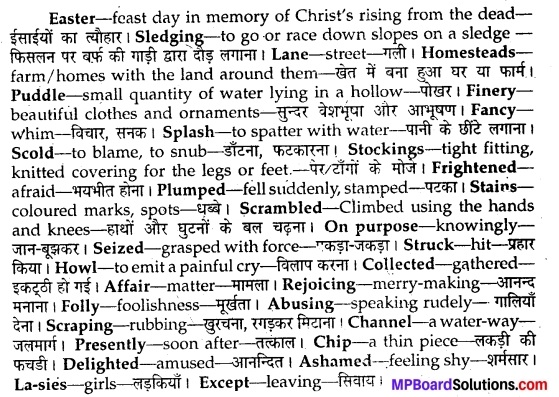
We believe the information shared regarding MP Board Solutions for Class 9 English The Rainbow Solutions Chapter 3 Little Girls Wiser than Men Questions and Answers as far as our knowledge is concerned is true and reliable. In case of any queries or suggestions do leave us your feedback and our team will guide you at soonest possibility. Bookmark our site to avail latest updates on several state board Solutions at your fingertips.



